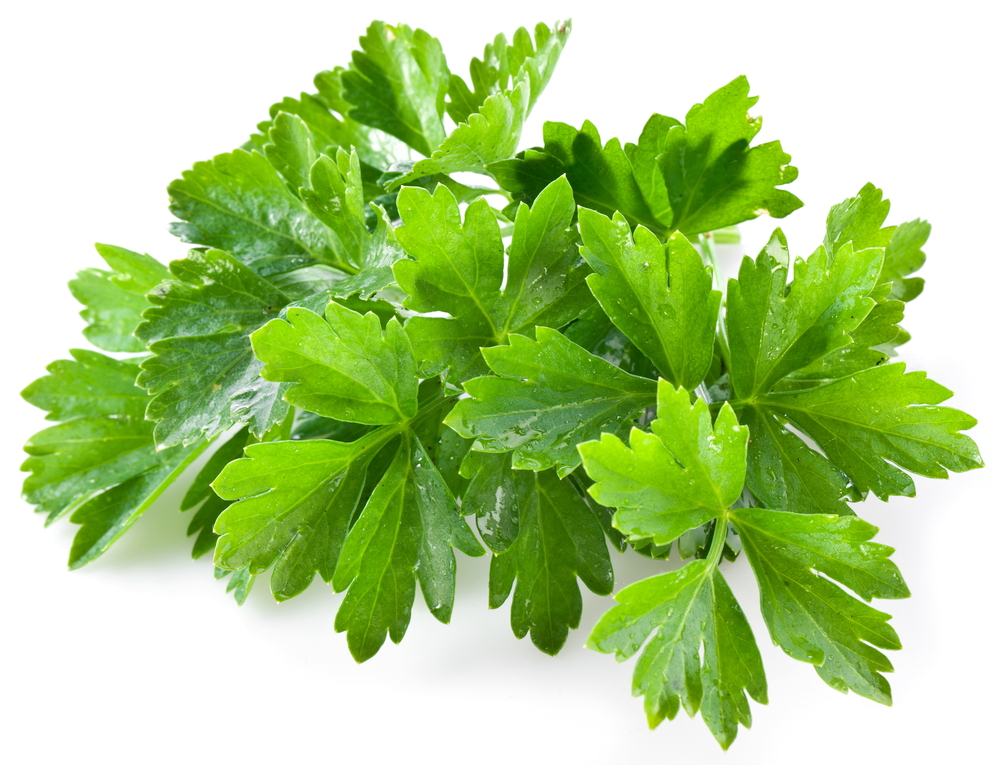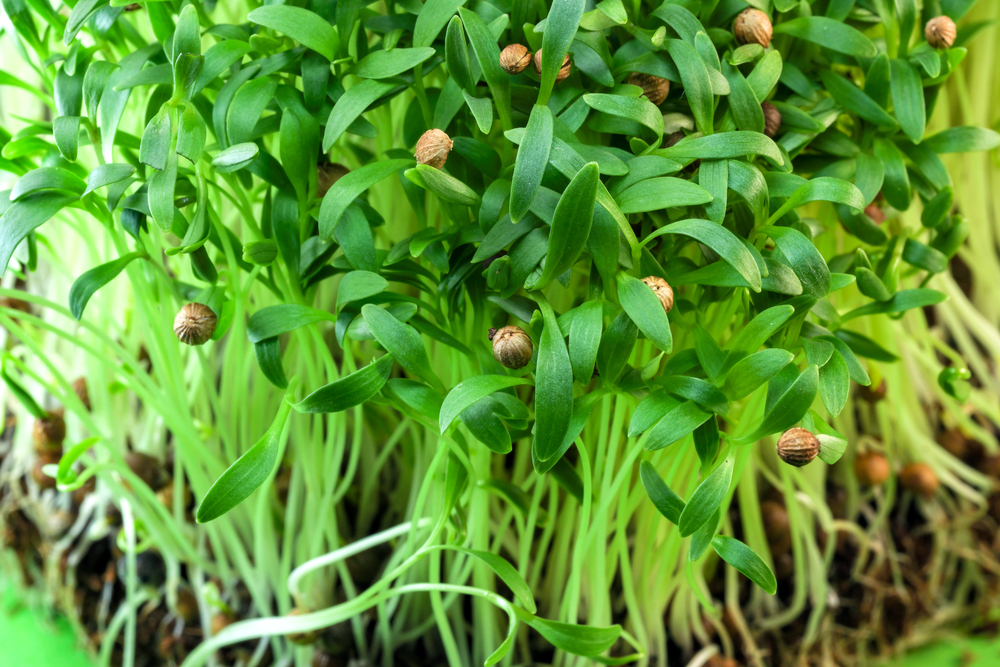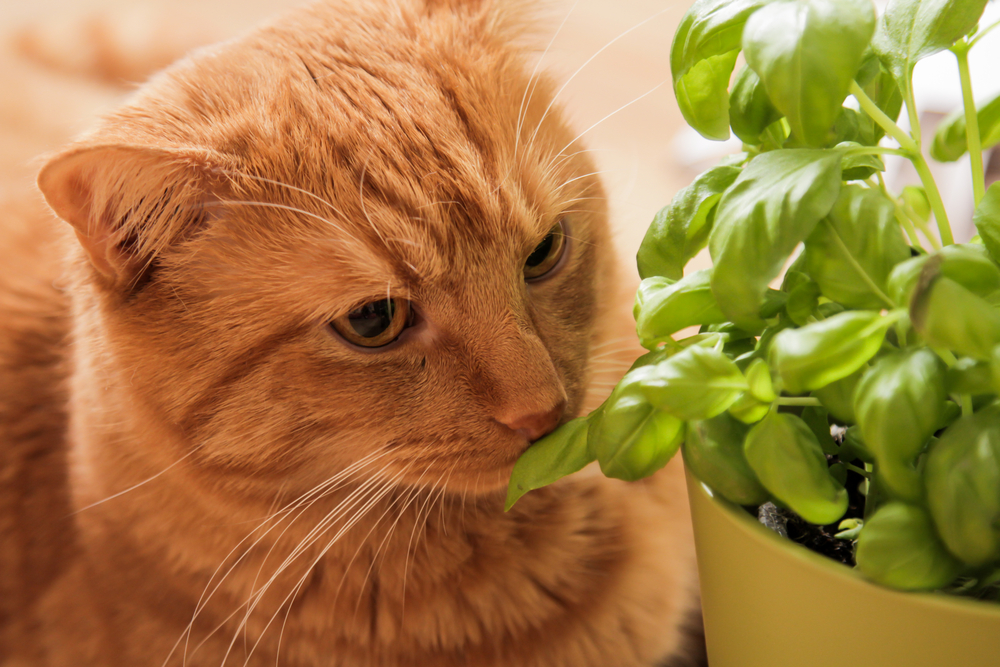
You may see some dried or fresh cilantro (or ‘coriander’) in your kitchen and wonder if it is something your cat can eat. Perhaps you’re considering adding it to their meal, or you’re worried about the potential toxic effect if they were to get hold of some. Read on to discover whether or not cats can safely eat cilantro.
Cilantro is a common herb with a lemony flavor used in cooking all around the world. It is non-toxic to our pet cats and can be eaten safely in modest amounts. However, it can be an acquired taste that not every cat will appreciate.
Is cilantro safe for cats?
Cilantro is entirely safe for cats and is a non-toxic herb, that is a member of the Parsley family. It should not cause any adverse effects if eaten. As cats are obligate carnivores, their diet should consist of mostly meat. While adding a small amount of herbs to their diet is perfectly fine, we don’t want to be feeding them an abundance of plant material. They will be the first to let you know, they want to eat meat!
Pros of adding cilantro to your cat’s diet
If your cat enjoys the taste, cilantro is a nutritious additive for their meal. It contains a range of vitamins and minerals including Vitamin C, Vitamin K and calcium.
Some cats enjoy discovering new flavors and will appreciate having something new to try at meal times.
There is also some evidence that cilantro may help to protect cats against infections and to bolster their immune system.
Cons of Giving cilantro to your Feline
Unfortunately, some cats really dislike the taste of cilantro. In fact, you may see them drooling or grimacing after they sample it. For some, the flavor is so offensive, they will refuse the whole meal if it contains the herb. This can mean you having to throw away a perfectly good meal.
For some sensitive cats, feeding too much coriander can result in a mild stomach upset. They could develop loose stool, abdominal bloating or vomiting. This, however, would be rare.
Can cats eat all forms of cilantro?
Cilantro can be consumed raw, dried or cooked. No form of this herb is toxic. So, add it to your cat’s diet as you wish. Importantly, always wash fresh cilantro well before serving it. There have been reported cases of cilantro contaminated with bacteria including Salmonella, which could make your cat very unwell.
Is it okay for felines to consume cilantro stems, seeds, sprouts?

Yes, absolutely. Cats can safely eat all parts of the cilantro plant. In fact, some owners will allow their cat access to a pot containing the herb so they can choose which part they wish to eat. This can be a nice addition to a ‘cat garden’ that contains cat grasses and other safe herbs.
The seeds are known to be rich in nutrients including calcium, iron and potassium. The sprouts have a similar concentration of Vitamin K to spinach.
Can cats be allergic (sensitive) to cilantro?
A true allergy to cilantro would be very rare, though not impossible. More likely, if a cat has a bad reaction to the herb, they are sensitive to it. If you find your cat develops a mild stomach upset after eating cilantro, it is best to keep them away from it going forward.
Would cilantro be safe for a pregnant cat or those with diseases)?
There is no reason we cannot feed cilantro to a cat who is pregnant or nursing. There is no data to show that this would have any adverse effect on either mum or kittens.
As a non-toxic and nutritious plant, cilantro is safe to feed cats regardless of their health status. However, it is best to avoid offering it if your cat requires a prescription diet. For example, those on a hypoallergenic food or those with kidney disease should stick to the diet issued by their vet.
My cat ate cilantro! What to do?

Firstly, do not panic. Perhaps your cat has snuck some cilantro out of your larder or off your plate. You may be worried, especially as you never meant for them to ingest the herb. However, you can rest assured, they are at no risk whatsoever. As cilantro is non-toxic and well tolerated by cats, they will be just fine. However, if they also managed to snaffle some onion or garlic off your plate, this is another story. Contact your vet as these veggies can be toxic.
What should I do if my cat likes cilantro?
If you discover your cat is a bit of a foody and enjoys the unique taste of cilantro, there is no reason you cannot indulge them every now and then. We’d advise offering it a maximum of once a week.
To keep them interested, why not serve it in a variety of manners? One week you can sprinkle some fresh herbs on their dinner, the next week you could let them nibble it from a potted plant.
Safe alternatives to cilantro include herbs such as parsley, celery and dill. These are all readily available from your local supermarket. They can also be easily grown in your garden.
‘Relatives’ of cilantro and their effect on cats
While we now know that cilantro is safe for our kitties, what about similar herbs? Are they all okay for them to eat? Let’s take a look at some of the most popular options out there:
- Fennel. While fennel itself is safe to offer in small amounts, the ASPCA advises not to feed felines concentrated fennel oil. It has been linked to photosensitive dermatitis. This is a scaly and red skin disorder that tends to affect lighter furred cats.
- Dill. Dill is a great addition to any fish dish. It is not poisonous for our cats and some may enjoy the fresh, citrus taste when sprinkled on their food in moderation.
- Parsley. When given in small amounts, parsley is a safe and tasty ingredient that you can add to your cat’s meals. Indeed, many experts believe it may aid digestion and reduce gas build up within the gut. It is rich in antioxidants and can help strengthen the immune system.
- Celery. While celery is non-toxic and all parts of the plant can be consumed by cats, most refuse to sample it. For whatever reason, it is not generally palatable to our feline friends.
- Anise. Anise has a strong and distinctive flavor. Some cats enjoy it, while others detest it. As it is tolerated by cats, consider offering your kitty a small portion to see if they like it. Interestingly, anise is sometimes called the ‘cat nip for dogs’ because of the effect it has on Fido.
- Cumin. Though there are no reported cases of cumin toxicity in cats, it has a warm, spicy flavor that may be too rich for your feline. The distinctive earthy taste is not one most cats are keen to sample.
- Oregano. This herb should not be fed to cats under any circumstance. The oils build up inside your cat and lead to toxicity. Oregano oil is the most potent form and must be avoided at all costs.
- Tarragon. Also known as French tarragon, this herb can cause mild vomiting and diarrhea in cats so is to be avoided. If you suspect your cat has had access to tarragon, contact your vet.
Please Pin & Share!

Conclusion
If you have decided to branch out and offer your feline friend something new for dinner, be sure it is a safe option. Many herbs are fine to feed in small amounts, but always double check.
Cilantro is safe to add to meals every now and then, though not every cat is a big fan. A good alternative would include parsley or cat grass. Take a look at the ASPCA’s web page on the use of cilantro for our pets.
*VET TIP*: When offering your cat something new, ensure it is the only new ingredient they are getting. It you offer them cilantro for the first time, it should be alongside food they are familiar with and you know they tolerate. Otherwise, if they were to become unwell, you might know which new ingredient was the culprit.
Please Share Your Thoughts in the Comments Below!
Happy Pet Care!

